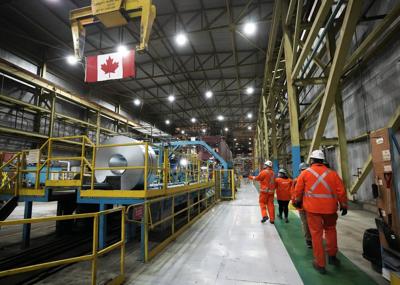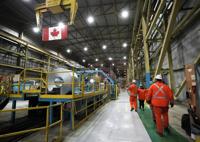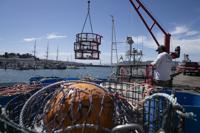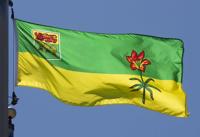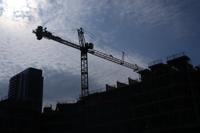OTTAWA - Some economists are putting an increasingly optimistic slant on Canada's tariff dispute with the United States, arguing the economy should be able to avoid "worst-case" scenarios from the trade war.
That doesn't mean the ║├╔źtv economy gets off scot-free ÔÇö a new forecast published by Deloitte Canada on Wednesday calls for a modest recession to hit in the second and third quarters of the year as uncertainty and weakness caused by tariffs start to bite.
"We do think the economy really is going to be considerably slower," said Dawn Desjardins, chief economist at Deloitte Canada.
After a surprisingly strong first quarter that saw many businesses rush their orders to get ahead of looming tariffs, ║├╔źtv exports were already showing signs of a steep decline in April.
Weakness in the manufacturing side of the labour market is expected to broaden in the months ahead, Deloitte Canada said. The unemployment rate is forecast to rise to 7.3 per cent by the fall from May's level of seven per cent.
But Desjardins said this downturn could be much worse if Canada hadn't secured tariff exemptions for CUSMA-compliant exports in early negotiations with the United States.
U.S. President Donald Trump's move to double steel and aluminum tariffs to 50 per cent earlier this month means those sectors are still set to take steeper hits, she said, particularly if Canada levies more reciprocal tariffs at the end of a 30-day negotiation deadline in July.
Deloitte said parts of eastern and Central Canada, as well as British Columbia, will see subdued growth this year from the tariff dispute while the prairie provinces and Newfoundland and Labrador will see their output rise, thanks largely to energy exports.
Overall, Desjardins said the status quo ÔÇö if maintained ÔÇö does not mark the "worst-case outcome" for Canada's economy that some might have feared a few months ago when tariff talks were ramping up.
Deloitte expects that, even with two negative quarters, Canada will post real GDP growth of 1.1 per cent this year. That would accelerate to 1.6 per cent in 2026 ÔÇö not headline shattering growth by any means, but better than a protracted downturn.
Unemployment would also drop back below seven per cent early next year, the report said.
Deloitte is not the only one bringing a bit of optimism to the forecast.
RBC published a report June 13 that also focuses on Canada's upside risks ÔÇö economist shorthand for ways things might turn out for the better ÔÇö amid what it called a "gloomy" outlook on the trade war to date.
"While CanadaÔÇÖs economic path forward remains challenging, it appears considerably less treacherous than it did just a few months ago ÔÇö a narrative that has yet to permeate the ║├╔źtv psyche," the RBC report read.
Consumer and business confidence has taken a hit as ║├╔źtvs wait for an outcome from trade negotiations with the United States, but RBC noted the hard data so far shows households are still spending despite the uncertainty.
Desjardins also believes that once businesses get a bit more clarity on the trade front ÔÇö talks so far appear productive, she said ÔÇö they will also have the confidence to pick up investment again.
She projects that will set up an economic recovery starting in the second half of the year, fuelled in part by a pair of additional quarter-point rate cuts from the Bank of Canada in the coming months.
RBC, on the other hand, believes the economy is showing enough life that it doesn't need any support from additional rate cuts this year.
That could change if cracks start to form in the economy, but RBC's assistant chief economist Nathan Janzen said he expects the central bank will remain on hold given "resilience" in the economy.
"There is still room for the Bank of Canada to respond with more monetary policy support if the economy needs it," he said.
Both RBC and Deloitte point to recent steps taken by the federal government as girding Canada's economy from a steeper economic downturn.
The House of Commons passed Bill C-5 at the end of last week, a sweeping set of legislation that aims to reduce interprovincial trade barriers and speed up major project development.
Desjardins said the bill helps address long-standing reputational issues that ║├╔źtv industry is slow-moving and gets mired in red tape before getting shovels into the ground.
While economists have long been banging the drum to draw attention to Canada's weak business investment levels and flagging productivity, she said the "jolt" of the trade war has finally ÔÇťbrought this to the top of this agenda.ÔÇŁ
"This signals to business that Canada is now ready to move to a stronger playing field," she said. 
RBC agreed that "action on interprovincial trade barriers could pay long-run dividends helping to support investment and productivity growth."
Uncertainty about the U.S. market in the global trade upheaval also offers an opportunity for resource-rich Canada to support growing worldwide demand for critical minerals necessary to power artificial intelligence and defence products, RBC said.
Desjardins said it could be years before today's steps to knock down interprovincial trade barriers and build out national infrastructure pay dividends. It takes time to reorient supply chains, and manufacturing industries in some provinces will still take a hit during the adjustment.
But she argued that the signal is nearly as important as the outcome when it comes to giving businesses the confidence they need to invest.
Adopting this "One ║├╔źtv Economy" framework, as Ottawa has dubbed it, "is not a magic wand that changes the landscape," Desjardins said.
"It is building more resilience in the economy and more room for growth."
This report by ║├╔źtvwas first published June 25, 2025.

